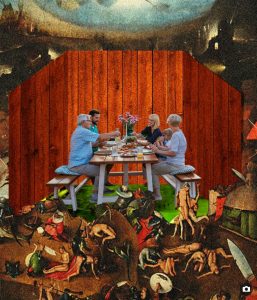- Andrew Sullivan on Trump;
- How Trump supporters rationalize whatever crazy things he does, from Charlie Warzel and Molly Olmstead;
- Trying to understand what Trump’s crackdown on science will accomplish;
- Another item about the Christian right’s war on empathy; have I misunderstood Christianity all this time?;
- And items about how books removed from the Naval Academy Library reveal the administration’s racism and defense of white supremacy.
Some of us call out the emperor’s new clothes.
Andrew Sullivan on Substack, yesterday (via Carl Freedman)
“Once you grasp Trump as an elected monarch, his full rebuke to the very idea of America comes into clearer view. He is precisely — almost uncannily — what this country was founded to oppose: an arbitrary, corrupt, mendacious, and utterly incompetent king.”
\
While members of cult are sure the leader is always right. Whatever crazy thing he’s just done, it must be part of a master plan.
\
Three days ago.

The Atlantic, Charlie Warzel, 9 Apr 2025: There Was Never a Master Plan, subtitled “Trump backed down on tariffs. His supporters think that was the idea all along.”
Beginning:
To plainly state what is going on right now would make you sound delusional.
The president of the United States has essentially been holding the global financial system hostage. He’s done so by threatening massive tariffs on nearly 100 countries and territories, including one that is unpopulated. These tariffs, which were set to go into effect today but have now been put on a 90-day pause for every country except for China, which will see a 125 percent tax on exports, seem to have been calculated using a blanket formula that some economists and trade experts find almost nonsensical. (Many have speculated that the math was done by a chatbot.) The administration’s supporters do not have a coherent message about why any of this is happening; before President Donald Trump announced the pause, they’d argued simultaneously that the tariffs were a temporary negotiating tactic but also that they might be durable enough to bring manufacturing jobs back to the United States.
Going on and on in this vein. He concludes with my thought that eventually reality strikes back.
That sufficiently motivated people might break with reality is by now somewhat predictable in American politics. But what’s far more uncertain is what happens when reality punctures the protective bubble of cognitive dissonance. QAnon devotees and MAGA die-hards were certain that Trump won the 2020 presidential election. When reality became impossible to ignore, we got January 6. Few events have the power to pierce the veil, but a global financial crisis could be one of them. What happens if the true believers are confronted with a truth they can’t look away from? History suggests it won’t go well.
\
More about MAGA spinning.

Slate, Molly Olmstead, 9 Apr 2025: “Email Jobs” and iPads subtitled “What a week of furious MAGA spin on tariffs can tell us.”
It’s rare, these days, for a decision by President Donald Trump to evince anything but a unified reaction from his die-hard supporters. But this week’s experiment with reciprocal tariffs—carrying promises of disaster for small businesses and American consumers and based on incoherent models and a bizarrely simplistic understanding of global trade and supply chains—forced the MAGA influencers to think more creatively. As the spin turns again after Wednesday afternoon’s maybe-reversal from Trump (followed by a definite reversal from the Nasdaq), pro-Trump voices’ reaction over the past week gives them a durable road map for another reversal—or for whenever Trump, almost inevitably, does something like this again.
Both of these articles mention a term I had not seen before.
It’s always hard to know how much the brash posts mocking Democrats and, in this case, “panicans”—a term that some influencers have been trying to make happen since Trump coined the term for tariff-worried Republicans in a Truth Social post on Monday—represent genuine positions, rather than just trolling. At this point in modern conservative politics, the difference doesn’t really matter.
…
“You do NOT need the new iPad,” one notable far-right commentator wrote. “You do NOT need the new video game console. You WANT them. There is a big difference and if you look at the people whining about the tariffs I challenge you to ask them how their lives have been affected in any way.”
Sour grapes? This is flabbergasting given conservatives’ traditional support for capitalism. People are *supposed* to buy new things to keep the economy going!
The piece goes on with further rationales and claims that the pain of these tariffs is to be endured in order to ‘save the country’. From what? Something other than a white nationalist theocracy? That seems to be what the cultists want.
\\\
Another piece from three days ago.

Vox, Bryan Walsh, 9 Apr 2025: The self-inflicted death of American science has already begun, subtitled “Trump’s crackdown on foreign students and scientists will do irreparable harm to the country.”
I’ll comment, rather than quote. Has it been unfair of America to gain worldwide scientific supremacy in part via foreign students and foreign scientists who’ve been allowed to come to our country? (As part of the centuries-long ‘melting pot’ of immigrants, many of whom escaped oppressive foreign regimes.) I doubt MAGA/DOGE has thought this through. On the one hand, you could argue that xenophobic Americans, who think for some reason that they are the cream of the human race, don’t need any ‘furriners’ to help them (ignoring history); on the other hand, it’s obvious that as America steps down from leadership in science, other countries will fill the gap. Currently, China is the best candidate.
\\\
A piece that confounds my understanding of what Christianity was supposedly all about.
The Guardian, Julia Carrie Wong, 8 Apr 2025: Loathe thy neighbor: Elon Musk and the Christian right are waging war on empathy, subtitled “Trump’s actions are irreconcilable with Christian compassion. But an unholy alliance seeks to cast empathy as a parasitic plague”
Long piece, worth another visit, but for now I’ll quote the opening:
Just over an hour into Elon Musk’s last appearance on Joe Rogan’s podcast, the billionaire brought up the latest existential threat to trouble him.
“We’ve got civilizational suicidal empathy going on,” Musk said. “And it’s like, I believe in empathy. Like, I think you should care about other people, but you need to have empathy for civilization as a whole and not commit to a civilizational suicide.”
The idea that caring about others could end civilization may seem extreme, but it comes amid a growing wave of opposition to empathy from across the American right. Musk learned about “suicidal empathy” through his “public bromance” with Gad Saad, a Canadian marketing professor whose casual application of evolutionary psychology to culture war politics has brought him a sizable social media following. By Saad’s accounting – and this is not dissimilar from the white nationalist “great replacement theory” – western societies are bringing about their own destruction by admitting immigrants from poorer, browner and more Muslim countries.
“The fundamental weakness of western civilization is empathy,” Musk continued to Rogan, couching his argument in the type of pseudoscientific language that’s catnip to both men’s followings on X. “The empathy exploit. They’re exploiting a bug in western civilization, which is the empathy response.”
No. This is the is/ought fallacy. Empathy might have been a weakness in the ancestral environment, in which tribe fought against tribe for limited resources and thus survival; but the world has changed. We’re a global society now, like it or not.
\\
Shorter items.
This was on the front page of the New York Times today.

NY Times, 11 Apr 2025: Who’s In and Who’s Out at the Naval Academy’s Library?, subtitled “An order by Defense Secretary Pete Hegseth’s office resulted in a purge of books critical of racism but preserved volumes defending white power.”
The article cites only three examples:
Gone is “I Know Why the Caged Bird Sings,” Maya Angelou’s transformative best-selling 1970 memoir chronicling her struggles with racism and trauma.
Two copies of “Mein Kampf” by Adolf Hitler are still on the shelves.
Gone is “Memorializing the Holocaust,” Janet Jacobs’s 2010 examination of how female victims of the Holocaust have been portrayed and remembered.
“The Camp of the Saints” by Jean Raspail is still on the shelves. The 1973 novel, which envisions a takeover of the Western world by immigrants from developing countries, has been embraced by white supremacists and promoted by Stephen Miller, a senior White House adviser.
“The Bell Curve,” which argues that Black men and women are genetically less intelligent than white people, is still there. But a critique of the book was pulled.
But that they used certain “key words” to search their database of books is by itself evidence of bias, of racism and xenophobia.
Locus Online has this piece about the matter, noting books by genre authors removed from the library because they were implicated for “promoting diversity, equity, and inclusion.”







